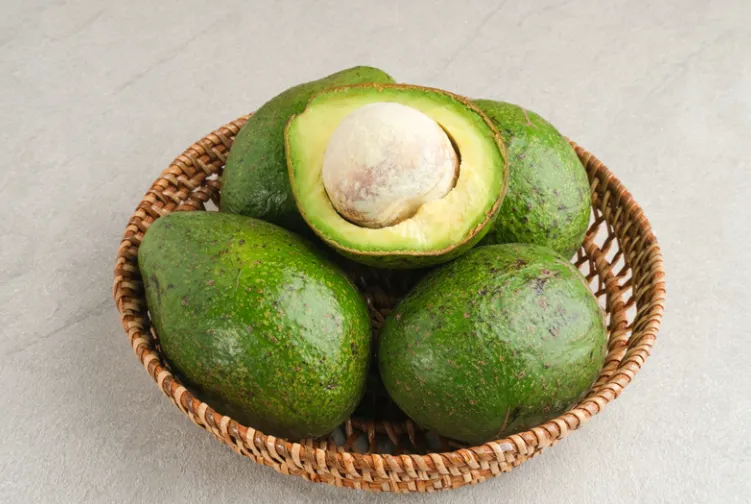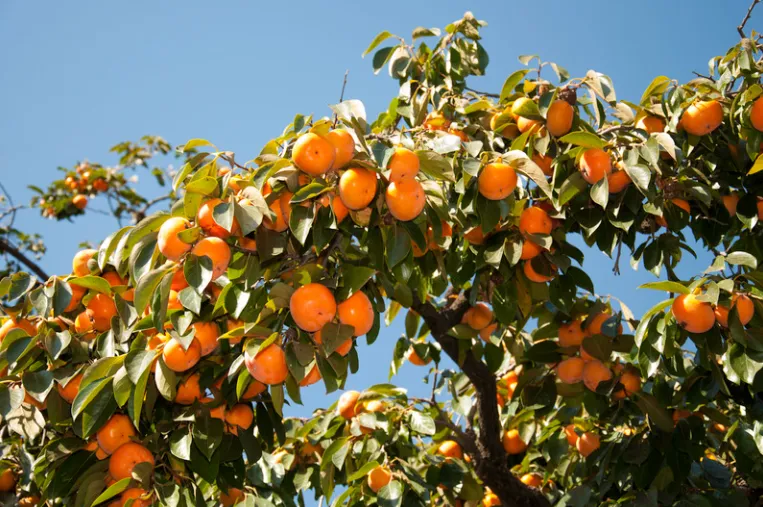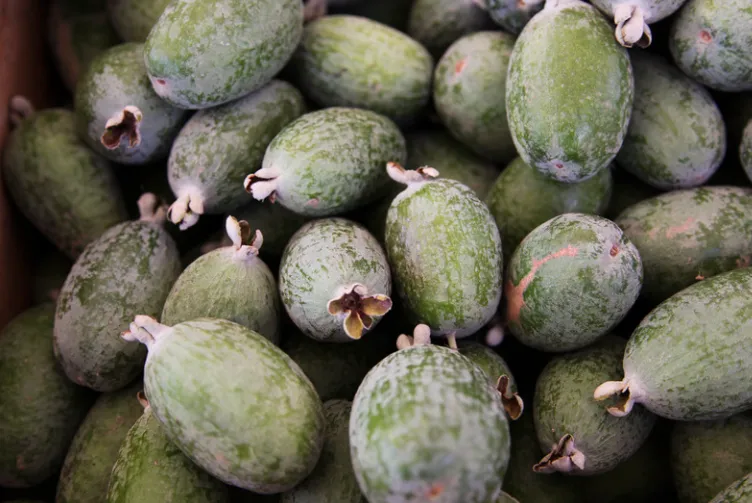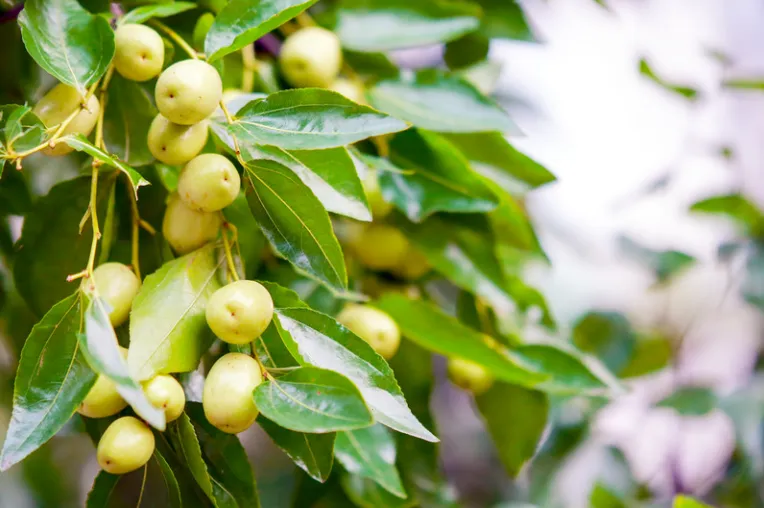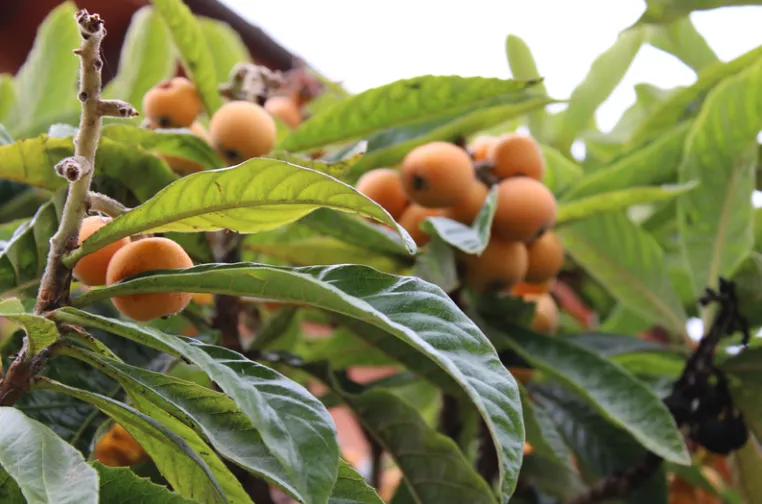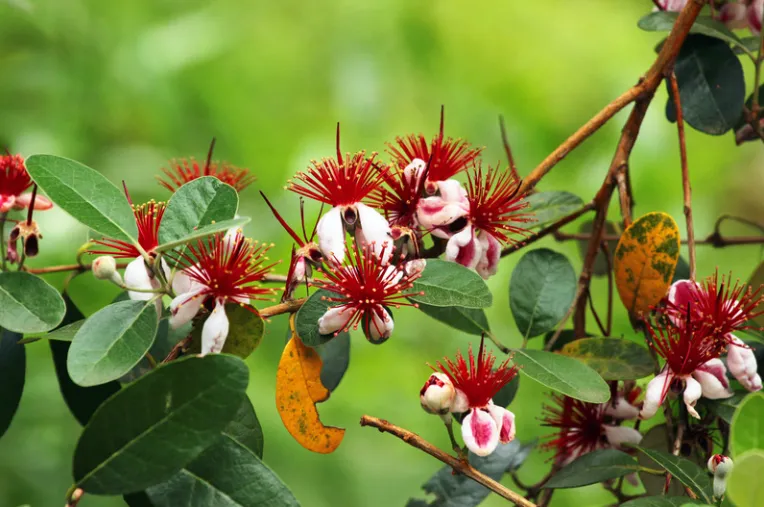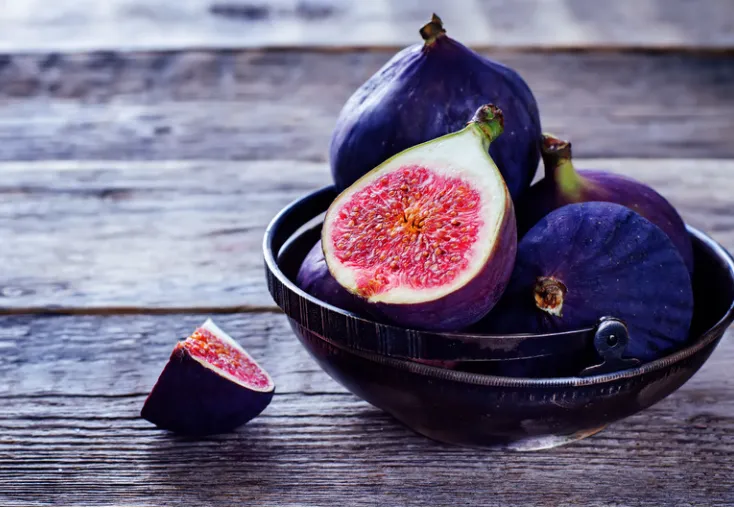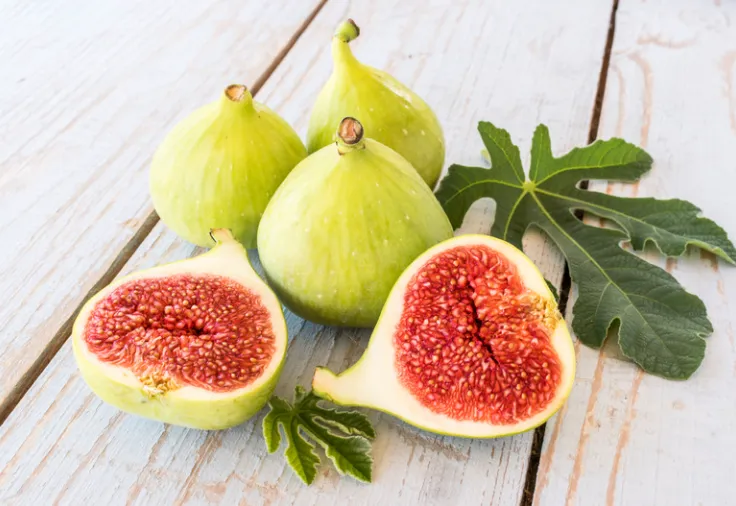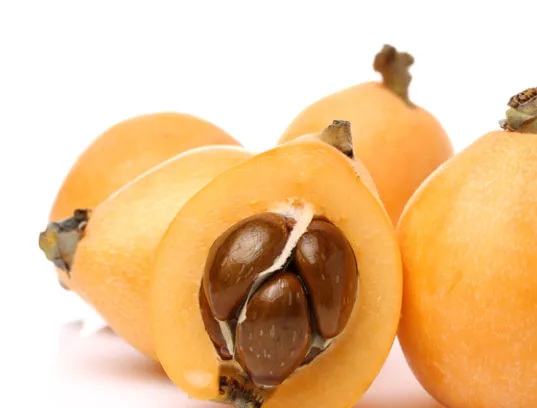
Local grocery stores are beginning to offer fruits from different regions. Shopping for fruit used to mean buying bananas, apples, oranges, melon, berries or stone fruits. Now you can commonly find things like pitaya, plantains, different varieties of mangoes, and the selection seems to keep growing. One of the biggest benefits of having such variety is that something is always ripe when you have fruit-bearing plants from so many different regions. At Honor Farm, we have continuous harvests of fruits from Asia, the Americas, the Mediterranean and some California favorites. Not only will this variety of fruits provide new flavors to your meals, but it can also help to boost your vitamin, antioxidant and mineral intake. Here’s a look at some of the health benefits offered by jujubes, tropical avocado, loquats, persimmons, figs and pineapple guava- some of our favorite fruit-bearing plants on the farm.
JUJUBES
Jujubes, also known as red dates or Chinese dates, are small, reddish-brown fruits that come from the Ziziphus jujuba tree, a species in the buckthorn family Rhamnaceae. Originating in China over 4,000 years ago, jujubes have been cultivated across a wide range of Asia for their culinary versatility and medicinal properties. The cultivation and appreciation of jujubes have since spread to many parts of the world, including the Middle East, southern Europe, and the southern United States.
Jujubes are small, with a size similar to that of an olive, and have a thin, edible skin that encloses a sweet, apple-like flesh. When ripe, they transition from green to deep red or purple, and the texture evolves from crisp and juicy to soft and chewy as they dry. Some varieties remain firm when ripe, while others become soft and wrinkled. Jujubes can be consumed fresh, dried, or processed into various products like candies, syrups, teas, and even vinegar, showcasing their versatility in both sweet and savory dishes.
Jujubes are not only prized for their unique flavor but also for their health benefits, attributed to their rich composition of vitamins, minerals, and phytonutrients:
- Nutrient-Rich: They are a good source of vitamin C, potassium, and fiber. Jujubes also contain important minerals such as iron, magnesium, phosphorus, and calcium, which play vital roles in bodily functions.
- Antioxidant Properties: Jujubes are high in antioxidants, including flavonoids, polysaccharides, and saponins, which can help protect the body against oxidative stress and reduce the risk of chronic diseases.
- Immune System Support: The high vitamin C content helps bolster the immune system, enhancing the body's ability to fight off infections and diseases.
- Improved Digestion: The fiber in jujubes promotes healthy digestion and can help prevent constipation, contributing to overall gastrointestinal health.
- Sedative and Calming Effects: Traditionally, jujubes have been used in Chinese medicine to improve sleep and reduce anxiety. Some compounds in jujubes, such as saponins and flavonoids, have been shown to have sedative and calming effects on the nervous system.
- Blood Sugar Regulation: Although sweet, jujubes have a low glycemic index (GI) and high fiber content, which can help in managing blood sugar levels, making them a healthier snack option for people with diabetes.
- Heart Health: The antioxidants and other compounds found in jujubes may contribute to heart health by improving cholesterol levels and overall circulation.
In summary, jujubes are a nutritious and delicious fruit with a long history of cultivation and use in traditional medicine. Their wide range of health benefits, combined with their culinary versatility, makes them a valuable addition to a healthy diet.
TROPICAL AVOCADOS
Tropical avocados, also known as West Indian avocados, are a type of avocado that thrives in the warm climates of the Caribbean, parts of South America, and other tropical regions. Unlike the more widely known Hass avocado, which is characterized by its smaller size, dark, bumpy skin, and rich, creamy texture, tropical avocados are larger, have smooth, bright green skin, and a lighter, more watery texture. They are one of the three main varieties of avocados cultivated globally, alongside the Mexican and Guatemalan types.
Tropical avocados are distinguished by their impressive size, often weighing several times more than the Hass variety. Their skin remains green even when ripe and is much thinner and smoother. The flesh of the tropical avocado is less oily, but still offers a subtle, slightly sweet flavor that makes it versatile in both savory and sweet dishes. Due to their lower fat content, they may not be as creamy as their Hass counterparts but are still highly valued for their nutritional benefits and culinary uses. These avocados are perfect for salads, smoothies, and dishes where a lighter texture is desired.
Tropical avocados share many of the health benefits of other avocado varieties, thanks to their rich content of vitamins, minerals, and healthy fats:
-Nutrient-Rich: They are an excellent source of vitamins C, E, K, and B-6, as well as riboflavin, niacin, folate, pantothenic acid, magnesium, and potassium. They also provide lutein, beta-carotene, and omega-3 fatty acids.
-Heart Health: The healthy fats in tropical avocados are mostly monounsaturated fats, which have been linked to reducing levels of bad cholesterol in the blood and lowering the risk of heart disease and stroke.
-Eye Health: The presence of antioxidants such as lutein and zeaxanthin is essential for eye health, protecting against macular degeneration and cataracts.
-Digestive Health: High in fiber, tropical avocados help promote healthy digestion and can aid in maintaining a healthy gastrointestinal tract.
-Weight Management: Despite their high-fat content, avocados have a high fiber content and contain fats that can help you feel full longer, potentially aiding in weight management efforts.
-Skin and Hair Health: The vitamins and healthy fats in tropical avocados can contribute to healthy skin and hair, keeping them moisturized and protected from damage.
-Antioxidant Properties: Avocados are rich in antioxidants that help fight free radicals in the body, contributing to reduced oxidative stress and inflammation, and offering protection against various diseases.
In summary, tropical avocados are a nutritious and delicious fruit that offers a unique alternative to the more common avocado varieties. Their large size and distinct texture make them a versatile ingredient in a wide range of dishes, while their health benefits contribute to a balanced and healthy lifestyle.
LOQUATS
Loquats (Eriobotrya japonica) are small, seasonal fruits that belong to the Rosaceae family, which also includes apples, pears, and peaches. Originating from the cooler hill regions of south-central China, loquats have been cultivated in Japan for over 1,000 years and are widely grown in subtropical to mild temperate regions around the world, including parts of the Mediterranean, Middle East, the Americas, and Australia.
Loquats are notable for their round to pear-shaped appearance, with a size that can range from one to two inches in length. They have a smooth or slightly downy skin that transitions from green to yellow or orange as they ripen. The flesh of the loquat is juicy, tangy, and sweet, containing several large, brown seeds in the center. Loquats are typically eaten fresh but can also be used in making jellies, jams, preserves, and various desserts. Their leaves are also valued in traditional medicine and can be brewed into a tea.
Loquats are not only delicious but also offer a variety of health benefits due to their rich nutritional profile:
- Nutrient-Rich: They are a good source of vitamins A and C, which are essential for immune function, skin health, and vision. Loquats also provide dietary fiber, potassium, and manganese, among other nutrients.
- Antioxidant Properties: Loquats contain antioxidants, including flavonoids and phenolic compounds, which help neutralize harmful free radicals in the body, reducing oxidative stress and potentially lowering the risk of chronic diseases.
- Heart Health: The dietary fiber in loquats can help manage cholesterol levels, thereby supporting heart health. Potassium, which is also found in loquats, helps regulate blood pressure.
- Digestive Health: High in dietary fiber, loquats can improve digestive health by preventing constipation and promoting regular bowel movements.
- Immune Support: With their high vitamin C content, loquats can boost the immune system, helping the body fight off infections and diseases.
- Anti-Inflammatory Effects: Some compounds in loquats have been shown to have anti-inflammatory properties, which can help reduce the risk of inflammatory conditions and support overall health.
- Weight Management: Being low in calories and high in dietary fiber, loquats can be a satisfying snack that helps with weight management by promoting a feeling of fullness.
In summary, loquats are a tasty and nutritious fruit with a wide range of health benefits. Their unique flavor and nutritional content make them a valuable addition to the diet, especially when consumed in season. Whether eaten fresh, used in culinary preparations, or utilized for their medicinal properties, loquats offer a delightful way to enhance both diet and health.
PERSIMMONS
Persimmons are a group of edible fruits from several tree species in the genus Diospyros. The most widely cultivated species is Diospyros kaki, commonly known as the Asian persimmon. The origin of persimmons can be traced back to China, where they have been cultivated for over 2000 years. From China, the cultivation of persimmons spread to Korea and Japan, and later to other parts of the world, including Europe and the Americas.
Persimmons are notable for their bright orange color and can vary in shape from spherical to acorn-like or even flattened. There are two main types of persimmons: astringent and non-astringent. The astringent variety, which includes the Hachiya persimmon, is very high in tannins and needs to become soft and ripe before it can be eaten. The non-astringent variety, such as the Fuyu persimmon, is less tannic and can be eaten while still firm.
These fruits have a sweet, honey-like flavor when ripe, with a smooth, creamy texture that can vary from jelly-like to crisp depending on the variety and ripeness. Persimmons are versatile in culinary uses, eaten fresh, dried, or used in various dishes, including salads, desserts, and even savory meals.
Persimmons are packed with a variety of vitamins, minerals, and antioxidants, offering several health benefits:
- Nutrient-Rich: They are a good source of vitamins A and C, which are important for immune function, skin health, and vision. They also contain manganese, fiber, and antioxidants.
- Heart Health: The fiber, antioxidants, and tannins in persimmons can contribute to heart health by helping to lower cholesterol levels, reduce blood pressure, and decrease inflammation.
- Digestive Health: High in dietary fiber, persimmons can help regulate digestion and prevent constipation.
- Weight Management: Being low in calories and high in fiber, persimmons can contribute to a feeling of fullness, potentially helping in weight management efforts.
- Vision Support: The high levels of vitamin A and antioxidants like zeaxanthin and lutein in persimmons support eye health and may protect against age-related eye diseases.
- Immune Support: With a good content of vitamin C, persimmons can support the immune system, helping to reduce the duration and severity of colds and other infections.
In summary, persimmons are not only a delicious and versatile fruit but also offer a wealth of health benefits, making them a valuable addition to a balanced diet.
FIGS
Figs (Ficus carica) are one of the oldest fruits known to humanity, with a rich history that dates back to ancient civilizations. Native to the Middle East and western Asia, figs have been cultivated since ancient times and are now grown in temperate climates around the world, including parts of the Mediterranean, USA, and Asia. Figs belong to the Moraceae family, which also includes mulberries and breadfruit.
Figs are unique in that the fruit is actually an inverted flower, and the seeds are the true fruit. They come in various colors, including purple, green, and golden yellow, depending on the variety. Figs are soft and sweet when ripe, with a slightly chewy flesh, smooth skin, and crunchy seeds. They can be eaten fresh or dried and are often used in baking, salads, jams, and cheese pairings due to their natural sweetness and rich flavor.
Figs are packed with nutrients and offer multiple health benefits, making them a valuable addition to a healthy diet:
- Nutrient-Rich: Figs are a good source of dietary fiber, vitamins A, B6, and K, and minerals such as potassium, magnesium, zinc, copper, manganese, and iron. They are also rich in antioxidants and phytonutrients.
- Digestive Health: The high fiber content in figs helps to maintain a healthy digestive system, aiding in regular bowel movements and preventing constipation.
- Heart Health: Figs have been shown to have a positive effect on heart health. The potassium content helps to control blood pressure, while the fiber can reduce levels of bad cholesterol in the blood.
- Bone Health: Figs contain calcium and magnesium, which are crucial for bone health and can help prevent bone-related disorders such as osteoporosis.
- Blood Sugar Regulation: Although figs are sweet, they have a relatively low glycemic index (GI). The potassium in figs also helps to regulate the amount of sugar which is absorbed into the body after meals, making them a healthy choice for people monitoring their blood sugar levels.
- Weight Management: The fiber in figs not only promotes digestive health but also provides a feeling of fullness, which can help in weight management by reducing overall intake.
- Antioxidant Properties: Figs are rich in antioxidants, which combat free radicals in the body, reducing oxidative stress and the risk of chronic disease.
In summary, figs are a delicious and nutritious fruit with a multitude of health benefits. Whether consumed fresh or dried, they can enhance the flavor and nutritional value of various dishes, contributing to a balanced and healthy diet.
PINEAPPLE GUAVA
Pineapple guava, scientifically known as Acca sellowiana (formerly Feijoa sellowiana), is a unique and flavorful fruit native to the highlands of southern Brazil, parts of Colombia, Uruguay, and northern Argentina. This evergreen shrub or small tree belongs to the Myrtaceae family, which also includes other well-known fruits like guava, eucalyptus, and clove. It has gained popularity in various parts of the world, including New Zealand, California, and the Mediterranean, for its ornamental beauty, delicious fruit, and resilience in different climates.
Pineapple guava is celebrated for its attractive flowers with edible petals and its ellipsoid fruits, which are roughly the size of a chicken egg. The skin of the fruit is thin, green, and edible, though it is often peeled due to its slightly bitter taste. The flesh inside is soft, juicy, and aromatic, with a flavor that uniquely combines the tastes of pineapple, guava, and sometimes a hint of mint or strawberry. The fruit contains small, edible seeds embedded within its jelly-like center. Pineapple guava can be eaten raw, added to salads, used in desserts, or processed into jams, jellies, and even beverages.
Pineapple guava is not only prized for its exotic flavor but also for its numerous health benefits, thanks to its rich nutritional profile:
- Nutrient-Rich: It is a good source of vitamin C and B vitamins, including niacin (B3), pyridoxine (B6), and pantothenic acid (B5), which are essential for energy metabolism, skin health, and nervous system function. It also provides dietary fiber, potassium, magnesium, and antioxidants.
- Antioxidant Properties: Pineapple guava is loaded with antioxidants, including vitamin C, flavonoids, and other phytonutrients, which help neutralize harmful free radicals in the body, reducing oxidative stress and the risk of chronic diseases.
- Digestive Health: The high fiber content in pineapple guava aids in maintaining a healthy digestive system, promoting regular bowel movements and preventing constipation.
- Immune Support: The rich vitamin C content boosts the immune system, enhancing the body's ability to fight off infections and diseases.
- Heart Health: Potassium in pineapple guava helps regulate blood pressure levels, while dietary fiber can lower bad cholesterol levels, contributing to improved heart health.
- Weight Management: Being low in calories and high in dietary fiber, pineapple guava can help in weight management by promoting a feeling of fullness and reducing overall calorie intake.
- Skin Health: The vitamins and antioxidants present in pineapple guava contribute to healthy skin by protecting against sun damage and reducing the signs of aging.
In summary, pineapple guava is a flavorful and nutritious fruit that offers a wide array of health benefits. Its versatility in culinary uses, combined with its ornamental appeal, makes it a favored choice among gardeners and food enthusiasts alike. Incorporating pineapple guava into the diet can enhance flavors and your health.
Exploring different regional fruits can be beneficial for both your diet and your overall health. Not only do they provide new flavors for your meals, but they also offer numerous vitamins and minerals that many other common fruits do not possess such as beta-carotene, polyphenols or antioxidants like quercetin – all key components when it comes to leading an active lifestyle. Here at Honor Farm, we grow all of these fruits and create recipes to highlight their amazingly unique flavors. Our fruits are available seasonally, but we strive to have these plants available year-round for you to add to your orchard or garden. Check out the links below to learn more.



Receive free recipes, education, and exclusive email offers for our products, those of our friends and affiliates and notifications of new content.

email: [email protected]
Disclaimer: * Should you make a purchase via a link found in this website, it's important to understand that we may have a partnership with the provider of the product or service you're buying, which could result in compensation for us. We encourage you to conduct your own research prior to making any purchases.
Copyright 2023. All rights reserved.

